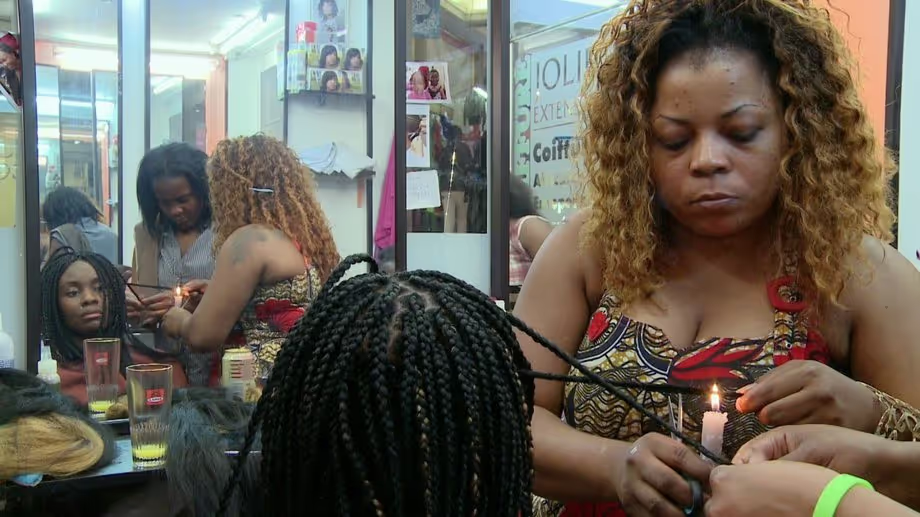Discussion Guide
Grades 6-8
Grades 9-10
Grades 11-12
Chez Jolie Coiffure: Discussion Guide Discussion Questions: After Viewing 'Chez Jolie Coiffure'
Discussion Questions: After Viewing 'Chez Jolie Coiffure'

Immediately after the film, you may want to give people a few quiet moments to reflect on what they have seen. You could pose a general question (examples below) and give people some time to themselves to jot down their thoughts, share their reflections with a partner, or to think about their ideas before opening the floor for discussion.
PROMPT ONE: Black Immigrant Experience - How does being Black and undocumented impact the immigrant experience?
- InChez Jolie, the weight of being a Black undocumented immigrant is something the audience is exposed to throughout the film. How do fear, violence, and trauma emerge as aspects of this experience? Likewise, how do the yearnings for visibility and safety become exposed in this film?
- In what ways does this film push you to reconsider ideas of “freedom” for undocumented immigrants?
- How do you think the freedom of movement clashes with the immigrant experience?
- Given the social, political and racial conditions in Belgium, in what ways is freedom experienced by Black people in the film?
- In what ways do we see the limited freedom of Sabine and those who visit her shop?
- Had you ever thought about the trauma, violence and weight of the (undocumented) immigrant experience? If yes, in what ways? If no, how doChez Jolie and Sabine open up new ways of thinking of the pain associated with migrating somewhere new?
- Who gets the privilege of being an expat? Who is labeled an immigrant? In what ways are these labels informed by race and class? What consequences do these labels have on the freedom and possibilities of the people who are defined by them?
PROMPT TWO: Creating Community as Safety and Belonging
- In Chez Jolie, the salon becomes the meeting place and, essentially, the hub for people from the continent of Africa. Why do you think this is so? In what ways does the community that forms in the salon expand and nuance your ideas of community, home, and family?
- How does the film cement the importance of finding yourself and those with similar experiences? In what ways do you believe common experiences are integral to the immigrant experience...as a form of survival, belonging, and self-preservation?
- What do you notice about Sabine’s role in cultivating and shaping this community?
- In what ways is the salon a space where African residents who visit and gather can be free? In what ways is this community also restricted?
- Can you think of other (marginalized/oppressed) groups of people who are “free” but also restricted in certain places?
PROMPT THREE: Colonialism, Power, and the white gaze
- How does this film explore the tensions between race, space, belonging and power?
- In what ways does this film make you (critically) question the impacts that histories of racism and colonialism (specifically colonial whiteness) continue to have on non-white people?
- Is there a violence inherent in the white gaze? If so, can you describe the violence? How does the white gaze impact, limit, or threaten those who are being gazed upon? What new questions do you now have?
- How do you observe violence and trauma of the white gaze and colonial whiteness in Chez Jolie? What feelings emerge for you?
- How do Sabine, those who visit the shop, and the filmmaker take power back?
PROMPT FOUR: The Power of Framing and Storytelling
- Rosine Mbakam is a Cameroonian-born filmmaker living in Belgium. She took great care in how she framed Sabine’s experiences. Mbakam expressed that the film became a collaboration between her and Sabine, as Sabine helped her film all the sides of her story. Why is it important to consider who is telling whose story? What are the ethics of telling another persons’ story?
- In what ways is it important that the storyteller shares common cultural experience(s) as the subject and/or those whose story they are telling? In what ways do you think the collaboration between Rosine and Sabine impacted the story?
- In what ways does Chez Jolie offer new stories and narratives of Blackness and the (undocumented) immigrant experience?
- In what ways does Rosine use her power as a filmmaker to frame this story and take back power?
- Nothing About Us Without Us is a mantra that became the rallying call for the United Nations Convention on the Rights of Persons with Disabilities. Recently, other oppressed and marginalized groups have taken up this mantra to mean thatmovements and stories and change must center the people that the fight is for.
- How is this mantra relevant and important to Chez Jolie? Why is “nothing about us, without us” important? In what ways does this align with Chez Jolie?
- In what ways does the identity of the filmmaker impact the way the stories are told, framed, and represented? How does she bring the audience intimately into this film? How does she center the voices and experiences of the African residents?
- Rosine Mbakam used what is called the chamber method to make this film. She describes this method “...as the feeling of being stuck, not only in the story but the art.” The aesthetic of the film was a cinematic choice.
- What feelings did this method invoke?
- What thoughts, feelings and questions emerged about space and place by filming only in the salon?
- How does this method privilege Sabine and those who visit the salon?

